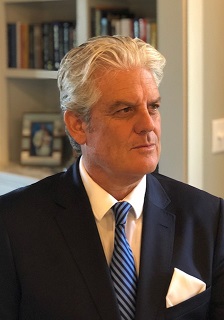From the CEO – May 2022
‘Though Hope be courteous and debonair, She’s never certain.’
— Jean de Meun, The Romance of the Rose (1275)

The data series from the International Country Risk Guide (ICRG) has long been back tested for accuracy and relevance. From the early 1990s, several of the ICRG’s risk metrics were shown to be predictive of equity market returns in emerging markets, and later these same metrics were shown to have the same qualities of risk events, with the appropriate ratings deteriorating (suggesting more risk) several months before the event was reported in the press. A host of other studies continued over the next three decades, underscoring the empirical connection between the ICRG data and – to name a few examples – economic growth, corruption, social turmoil and the pandemic, the viability of climate change policies, inflation and, most recently, global food insecurity.
While prospects for a global recession are becoming more likely, the case for stagflation – something we began addressing with clients at the end of last year as our indicators were pointing in the direction of climbing prices amidst sluggish growth – are beginning to be felt in the data, especially in Europe.
Representatively, Italy’s headline inflation came in at 6.9% (yoy) in May (up from 6% in April), which was the highest reading since the mid-1980s. Revised Q1 growth estimates showed a near miss on qoq contraction, with private consumption and net exports pulling down the number.
In France, inflation registered 5.2% in May (from 4.8% in April) – the highest also since the mid-1980s and driven by energy prices (up 28% on the year) – while Q1 growth estimates have been revised down, contracting 0.2% in Q1, owing to falls in household consumption, notably in relation to transport equipment and manufactured goods. The data on consumption in the volume of goods – published by France’s statistics agency – suggest a further decline in consumption of around -0.4%.
We could go through several countries and put forth the data that supports the stagflation thesis. Yet the concern now is the ECB’s next course of action. Recent minutes from the ECB show a decidedly hawkish tone taking over, as the effects of the war in Ukraine and wage pressures point to an almost certain July rate hike, with only real debate being whether it will be 25bps or 50bps.
Despite its effect on growth, the tightening should push the euro higher against the greenback and could be the single most important factor in easing prices. Since March the euro has lost about 5% against the dollar, and on a trade weighted basis the euro has fallen about 2%. The numbers are higher when compared to a year ago. Via the exchange rate channel, while a stronger euro won’t bring down energy prices, the bite they are taking now out of household spending could be alleviated since energy and other commodities are invoiced in dollars. I witnessed this over a decade ago – the last time gas prices were at the $100+ level – when the Canadian dollar shot past the greenback and prices on the northern side of the border became more manageable.
Next month I’ll write about the US economy, its outlook, and the present discussion about the political risks associated with higher prices, rising inequality, and social turmoil. There is an interesting risk story developing.
* * * * *
Turning to the ICRG ratings for May, some highlights are worth noting. In Europe, PM Viktor Orban and his FIDEZ scored big electorally last month, although questions about the country slipping into a more authoritarian political environment continue. Some new taxes could make rate hikes hard to bear. Slovenia has a new leader in Robert Golob, a political newcomer from the green formation. Yet the government’s job looks to be increasingly complicated on the economic side as Slovenia is especially vulnerable to a halt in Russian gas supplies.
The future of dissent in Belarus has taken a hit as the government recently expanded the use of the death penalty to include ‘attempts to carry out terrorism…’ Over in Kazakhstan, the defense budget has been upped and there are troop exercises along the border with Russia.
In the Middle East, Algeria’s government said it would adopt a more pro-Western economic model, as Italy looks to be a major purchaser of natural gas, boosting Algeria’s forex reserves. Meanwhile, there might be some hope for Lebanon, as Hezbollah and its allies lost seats in the recent parliamentary vote, with independents and Christian parties doing much better than initially hoped. Parliament looks to be fragmented but if the opposition forms a voting bloc some laws could be enacted to benefit the populace as opposed to sectarian leaders.
In the Americas, Rodolfo Hernández, a businessman and anti-corruption crusader, ousted established center-right candidate Federico Gutiérrez in Colombia’s first round voting for the presidency. Gutiérrez’s supporters are likely to back Hernández in the second round tally in June: former leftwing guerrilla Gustavo Petro’s win looks less assured. Look for violence to continue.
Cote d’Ivoire’s inflation came in at 4.5% in April (yoy), while Tiemoko Meyliet Kone, a regional central banker, was chosen to be the new VP. The economy looks to be in relatively good shape, driven by investment/private consumption. The 2023 Africa Cup will be a positive for jobs and infrastructure spending.
Finally, in Asia, Australia got its first Labour PM in a decade, as Anthony Albanese won about 36% of the vote in the recent parliamentary contest. The new leader has managed to cobble together a working majority in the lower house but will still need cross-party support in the Senate to get bills into legislation.
* * * * *
We’ve entered early-stage discussions with a leading Paris-based (and international) business school to create something truly unique in the AI/data driven geopolitical sector that will benefit both academics and firms alike. As I’ve mentioned on many occasions: political and country risk can only be truly meaningful if it can be quantified over time and across jurisdictions; when it can yield exceptional empirical findings; and when it can be applied to the behavior and protection of assets. On the latter, our work with the French school looks to be paired with a leading NYC/London-based AI trading platform so the ICRG data can offer more select trading positions on a range of asset classes.
We continue to receive considerable demand for our recently-released new addition to our popular Researchers’ Dataset series – one that offers clients a more granular look at the political risk components of the ICRG, supported by 20 years of monthly data. The new series works as an excellent complement to the other data bundles announced this year affecting ESG, corruption, and internal/external conflict. Scores of academic studies have been conducted using these series, providing unique insights in asset volatility, government responses to the pandemic, and many more. Contact us for more information.
May was another fruitful month for new and returning clients, ranging from some of the world’s top universities to the largest institutional investors throughout the US, Europe, the UK, and the Middle East and Asia. Our data are now regularly featured in the research of the IMF, Bank for International Settlements, and various central banks, such as the Bank of Italy.
Our new look PRS has arrived. Paying homage to our roots in the Hindu Arabic number system of the Renaissance period to more recently in the Behavioral Revolution of the late 1960s, the new PRS emphasizes the data driven nature of the firm. Countless studies in refereed journals using our ICRG data underscore the relationship between ICRG and various – and timely – political and economic phenomena: from inflation to food insecurity; from the economic consequences of armed conflict to the ramifications of the pandemic. No other geopolitical risk series occupies this mantle. Looking ahead, one of our new features will be a regular podcast series, showcasing interviews and discussions with some of the most distinguished practitioners and academics in the field of geopolitical risk, from such places as Saudi Arabia, Uzbekistan, the UK, and Dubai.
Our ICRG political risk scoring changes were very robust in May, affecting some 100 countries (of 141) and over 125 individual political risk metrics!!
ICRG and related PRS data continue to be the gold standard of all geopolitical risk data among the scholarly and research communities. For example, given the very real potential for food shortages globally, a recent study – employing our ICRG data and utilizing country-level data covering 124 countries in Asia, Africa, Europe, Latin America, and the Caribbean between 1984-2018 – examined the impact of political risk and institutions on food security, proxied by Dietary energy supply (DES).
Notably, the study found that that internal and external conflicts, socioeconomic conditions, corruption, military in politics, religious tensions, ethnicity tensions, and poor quality of bureaucracy worsen food security in developed and developing countries. While government stability, the role of law and order, democratic accountability, and investment profile affect the food supply positively and significantly. (https://lnkd.in/gcb_99t7)
Additionally, using our ICRG corruption index – along with some other ICRG metrics as control variables – another study offered some empirical observations on whether extreme climatic conditions in parts of the world are exacerbating food insecurity, price inflation and social disorder. Lots to digest: (https://lnkd.in/gKjP3ygd)
Finally, there are significant empirical linkages between political risk (as proxied by the ICRG data) and sovereign notes? For example, a 10 point increase in the ICRG composite risk score increases spreads by 150bpts; lower political risk integrates developed and emerging market bonds, lowering funding costs by about 1% annually; and sovereign bonds issued by more corrupt emerging markets move more closely with global markets during crises, and are thus more prone to sell-offs when sentiment deteriorates. (https://lnkd.in/gBdU26Yp) (https://lnkd.in/g4A7Kmi9) (https://lnkd.in/gNUqWixE)
Thanks for your continued support, and please contact us if we can be of any assistance.

Chief Executive

PRS INSIGHTS
Moving beyond current opinions, a seasoned look into the most pressing issues affecting geopolitical risk today.
EXPLORE INSIGHTS SUBSCRIBE TO INSIGHTS
